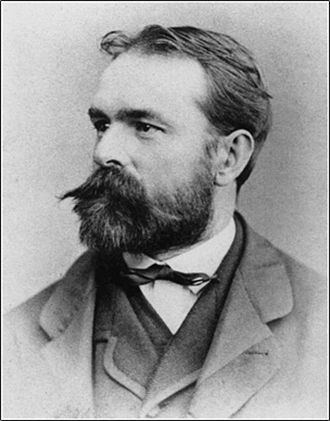Josef Rheinberger
(17 March 1839, in Vaduz – 25 November 1901, in Munich)
was an organist and composer, born in Liechtenstein but resident for most of his life in Germany.
Biography
Josef Gabriel Rheinberger, whose father was the treasurer for Aloys II, Prince of Liechtenstein,
showed exceptional musical talent at an early age. When only seven years old, he was already
serving as organist of the Vaduz parish church, and his first composition was performed the
following year. In 1849, he studied with composer Philipp M. Schmutzer (31 December 1821 –
17 November 1898) in Feldkirch, Vorarlberg.[1]
In 1851, his father, who had initially opposed his son's desire to embark on the life of a professional musician, relented and allowed him to enter the Munich Conservatorium. Not long after graduating, he became professor of piano and of composition at the same institution. When this first version of the Munich Conservatorium was dissolved, he was appointed répétiteur at the Court Theatre, from which he resigned in 1867.[2]
Rheinberger married his former pupil, the poet and socialite Franziska "Fanny" von Hoffnaass (eight years his senior) in 1867. The couple remained childless, but the marriage was happy. Franziska wrote the texts for much of her husband's vocal work.
The stylistic influences on Rheinberger ranged from contemporaries such as Brahms to composers from earlier times, such as Mendelssohn, Schumann, Schubert and, above all, Bach. He was also an enthusiast for painting and literature (especially English and German).
In 1877 he was appointed court conductor, responsible for the music in the royal chapel. He was subsequently awarded an honorary doctorate by Ludwig Maximilian University of Munich. A distinguished teacher, he numbered many Americans among his pupils, including Horatio Parker, William Berwald, George Whitefield Chadwick, Bruno Klein and Henry Holden Huss. Other students of his included important figures from Europe: Italian composer Ermanno Wolf-Ferrari, and German composers Humperdinck and Wilhelm Furtwängler (the latter much better known as a conductor). See: List of music students by teacher: R to S#Josef Rheinberger. When the second (and present) Munich Conservatorium was founded, Rheinberger was appointed Royal Professor of organ and composition, a post he held for the rest of his life.
On 31 December 1892 his wife died, after suffering a long illness. Two years later, poor health led him to give up the post of Court Music Director.[3]
Rheinberger was a prolific composer. His religious works include twelve Masses (one for double chorus, three for four voices a cappella, three for women's voices and organ, two for men's voices and one with orchestra), a Requiem and a Stabat Mater. His other works include several operas, symphonies,[4] chamber music, and choral works.
Today Rheinberger is remembered above all for his elaborate and challenging organ compositions; these include two concertos, 20 sonatas in 20 different keys (of a projected set of 24 sonatas in all the keys),[5] 22 trios, and 36 solo pieces. His organ sonatas were once declared to be
undoubtedly the most valuable addition to organ music since the time of Mendelssohn. They are characterized by a happy blending of the modern Romantic spirit with masterly counterpoint and dignified organ style.— J. Weston Nicholl, Grove Dictionary of Music and Musicians (1908 edition), v. 4, 85
Rheinberger died in 1901 in Munich, and was buried in the Alter Südfriedhof. His grave was destroyed during World War II, and his remains were moved to his home town of Vaduz in 1950.[2]
Piano Concerto in A flat Major Op. 94
Being Rheinberger’s only valid essay in the genre, the Piano Concerto in A-flat major op. 94 of 1876, merits special attention. It was splendidly received by contemporary musicians and critics and granted the shy and introverted Rheinberger a successful and amazingly smooth entrée into the world of the concert hall. Shortly after its creation the work was performed and wildly acclaimed in Munich, Leipzig), Cologne, and many other musical centers of Germany.
Written 1877
First Published 1878
1. Moderato
2. Adagio patetico
3. Allegro energico
Adrian Ruiz, piano
Nürnberg Symphony Orchestra
Zsolt Deáky, conductor
'♣ 음악 감상실 ♣ > [1820년 ~1839년]' 카테고리의 다른 글
| [체코]Vilém Blodek (0) | 2017.08.26 |
|---|---|
| [체코]Karel Bendl (0) | 2017.08.26 |
| [미국]John Knowles Paine- (0) | 2017.05.04 |
| [영국]Ebenezer Prout (0) | 2017.04.29 |
| [프랑스] Alexis de Castillon (0) | 2017.04.28 |



